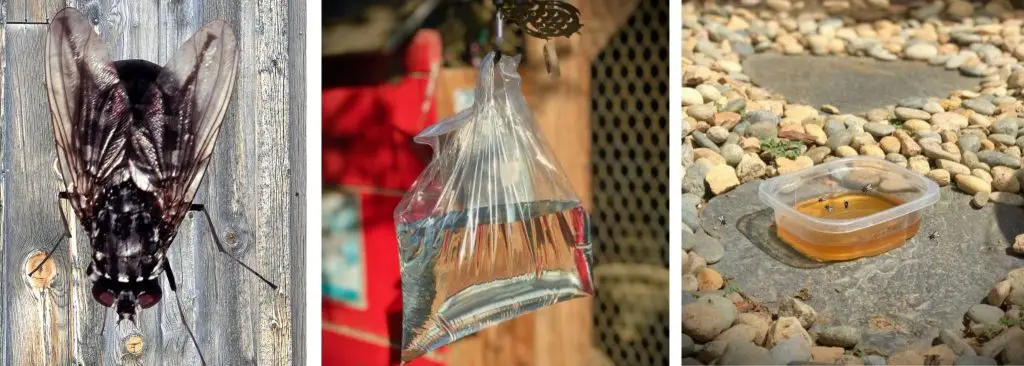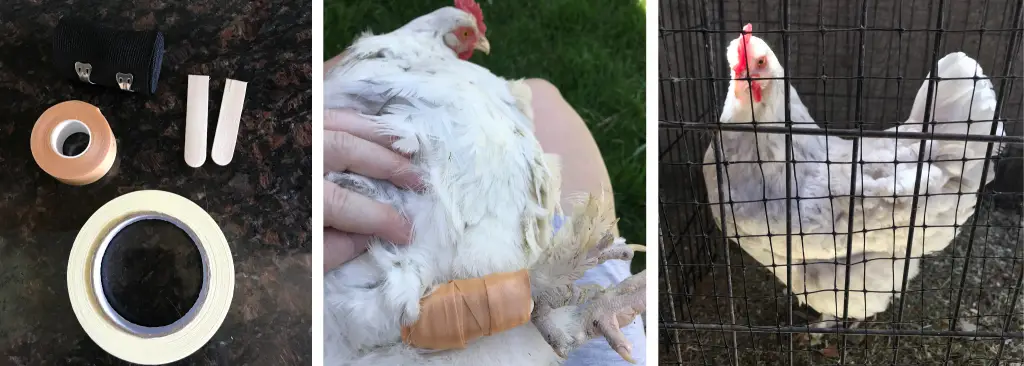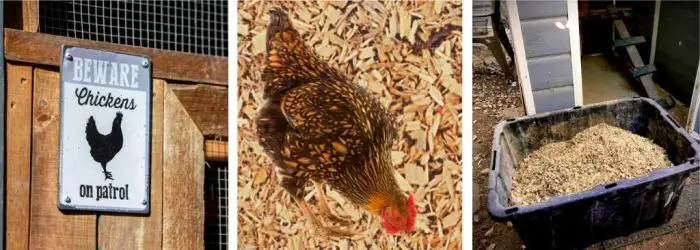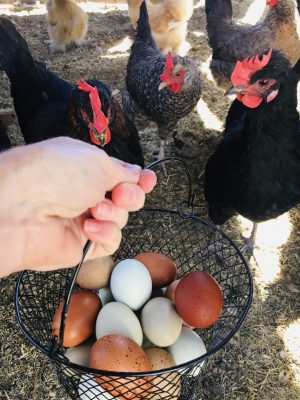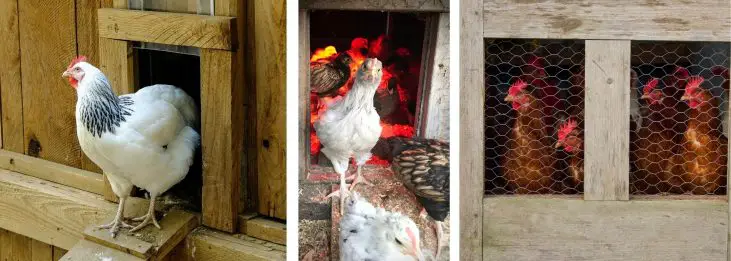
The chicken coop is a chickens safe enclosure. It is made to protect them from the outside elements and predators. But they need to get inside the coop at night to be safe. Do you know how to get your chickens to go into the coop at night? With a few coop modifications and training they will begin going to their coop to roost like clockwork!
- 1. Lock them in the Coop
- 2. Leave the Light On
- 3. Check the Chicken Coop for Parasites
- 4. Check the Coop for Predators
- 5. Make Sure You Have Enough Roosting Bars
- 6. Make Sure the Chicken Coop is Clean
- 7. Sprinkle Fresh Herbs in the Chicken Coop
- Conclusion: How to Get Your Chickens to Go Into the Coop at Night-7 Simple Tips
1. Lock them in the Coop
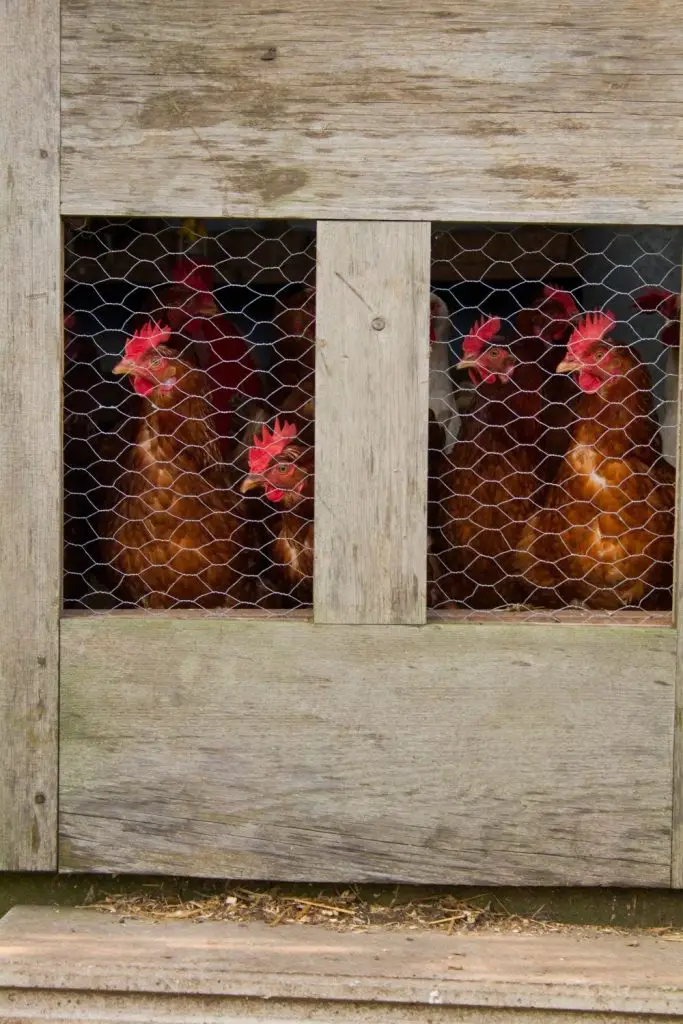
When you have new chickens, they need to know where “home” is. The chicken coop is where they need to be every night to roost.
Lock them in the Coop for 1-2 Weeks.
- Provide good ventilation.
- Make sure that the coop isn’t too hot for them.
- Provide daily food and water.
- Provide light in the daytime, but darkness in the evening.
After one week, let your new chickens out of the coop and keep an eye on them when it gets to the time they should be going up to their coop at night.
If they don’t make their way into the coop, try leaving a light on to entice them inside.
2. Leave the Light On
This has got to be the easiest method that I have used to train new pullets to return to the coop at night.
After 2 weeks of locking your new chickens in the coop, so they know where their home is, it’s time to let them out to their chicken run.
Move your flocks’ food and water out into the chicken run. From now on, they do not need to have food or water inside the coop. It is only an invitation for predators. (Food and water should be put away each evening.)
When it begins to get dark, chickens instinctively know to go find the highest place they can to roost. Have a timer set for a chicken coop light to come on at this time.
I use the same heat lamp light that they were used to having in their chick brooder.
As it gets darker, your chickens will be attracted to this brooder light and they will move into their coop.
Give them enough time to settle inside the coop up on their roosting bars. Once they are on their roosting bars, turn the light out. You can set a timer to do this too.
If you are finding that they are not going to roost before you turn the lights out, try giving them a night light.
Once they are all on the perch for the night, turn the night light off.
After about 1-2 weeks of doing this, you should be able to stop using the coop light to lure them in. They should come in without the light.
3. Check the Chicken Coop for Parasites

Parasites are tiny bugs that can live on your chickens. If left untreated, can lead to severe illness and even death. Chickens do not benefit in any way from living with parasites on them and they should be treated promptly so it doesn’t affect their health.
Chickens are prone to getting many different parasites, especially if they are not in a clean environment such as a dirty coop or exposed to wild birds or rodents.
If your coop is infested with parasites, chickens will not feel comfortable hanging out there. Check the nesting boxes and roosting bars for parasites. Check the underside of the roosting bars too. Mites like to hide out here.
| CHICKEN PARASITES |
|---|
| CHICKEN MITES |
| CHICKEN LICE |
| FLEAS |
| WORMS |
| CHIGGARS |
| FOWL TICKS |
How to Get Rid of Parasites Naturally

If you find that your chickens or coop is infested with parasites, you will need to do a deep cleaning of the coop and treat the whole flock.
There are several ways that you can get rid of parasites naturally. The following are 5 effective ways:
6 Ways to Get Rid of Mites Naturally
- Dawn Dish Soap: You can use Dawn Dish Soap to give your flock 20-30 minutes soaks or make a special spray out of it that you can apply directly to your chickens, walls, floors and nesting boxes.
- Apple Cider Vinegar: ACV can be used as a 20-30 minute soak or a special spray that you apply directly to both your chickens and the chicken coop. For the recipe for how to make the spray solutions, read my article 5 Simple Ways to Get Rid of Mites on Chickens-Naturally.
- Diatomaceous Earth: Can be used both in your chicken dust bath area and in the chicken coop nesting boxes and floor. This will help to kill any parasites. When chickens take a dust bath, they will fling the dirt and diatomaceous earth on top of them. It kills the parasites by coating them and suffocating them.(see below for chart of insects and parasites that diatomaceous earth kills).
- Wood Ash: Wood ash works like diatomaceous earth. It is best used in your chicken dust bathing area. Just make sure that you don’t add wood ash that is still hot to the dust bath.
- Dried Herbs: Dried herbs have many medicinal purposes, including killing and deterring parasites and insects.(see below for chart)
- Garlic Oil: You can crush 3-4 cloves of garlic and add it to your chickens water for 48 hours. This can be done up to twice a week. Parasites don’t like the taste of garlic in the chicken’s blood. You can also make a garlic oil spray with essential oils added for a better smell. This can be sprayed directly on your chicken and the on the walls, floor, nesting box in the coop. For the recipe, read my article 5 Simple Ways to Get Rid of Mites on Chickens-Naturally.
LIST OF INSECTS AND PARASITES DIATOMACEOUS EARTH WILL KILL
| FLIES | SLUGS |
| SAWFLIES | SNAILS |
| FUNGUS GNAT | CODDLING MOTH |
| BED BUGS | SILVERFISH |
| LICE | EARWIGS |
| FLEAS | BEETLES |
| TICKS | COCKROACHES |
| STINK BUGS | MITES |
| SQUASH BUGS | SPIDERS |
| TWIG BORERS | ANTS |
| THRIPS | APHIDS |
LIST OF HERBS THAT WILL REPEL PARASITES AND INSECTS
| HERBS THAT KILL MITES |
|---|
| LAVENDER |
| ROSEMARY |
| MINT |
| LEMON BALM |
| NUTMEG |
| CINNAMON |
| THYME |
| CLOVE |

Increases egg laying naturally.
- Improves chicken health.
- Deters parasites: mites, lice, fleas & flies as well as mice, rats, raccoons, coyotes, opossums and more!
- On SALE!
- Shop: Nesting Box Herbs
4. Check the Coop for Predators
- Check your chicken coop for predators. If they once used to go into the coop and are now suddenly refusing to go in, a predator may have come to visit them in the night and scared them.
- Inspect all areas for predators that may be hiding, such as snakes, rats, mice, etc.
- Inspect all gates, boards and doors and make sure that predators of any kind haven’t made holes to make their way inside at night.
- Mice are capable of squeezing through a hole as small as a dime.
- If you have any hardware cloth on your coop, it is best to use 1/4″ so snakes and small mice cannot get in.
- Snakes are known to sneak into coops at night and eat uncollected chicken eggs from the day before.
Top 10 Chicken Coop Rodents
| TOP 10 CHICKEN COOP RODENTS |
|---|
| BROWN RAT |
| BLACK RAT |
| WOOD RAT |
| DEER MICE |
| HOUSE MOUSE |
| GROUND SQUIRRELS |
| GOPHERS |
| GROUNDHOGS |
| CHIPMUNKS |
| VOLES |
Depending upon where you live you will encounter some type of predators. Know what predators are common in your area and make preparations to avoid them getting into your coop.
Common Chicken Predators
| COMMON CHICKEN PREDATORS |
|---|
| RACCOON |
| HAWKS, OWLS, EAGLES |
| DOG |
| FOX |
| COYOTE |
| WEASEL |
| MAN |
| MINK |
| OPPOSUM |
| BOBCAT |
| CAT |
| RAT |
| BEAR |
| SNAKE |
| SKUNK |
| MOUNTAIN LION |
For more information on how you can identify what type of predator attacked your chickens and how you can prevent a predator from attacking, read my article 11 Common Backyard Chicken Predators – How to Best Prevent Attacks.
5. Make Sure You Have Enough Roosting Bars
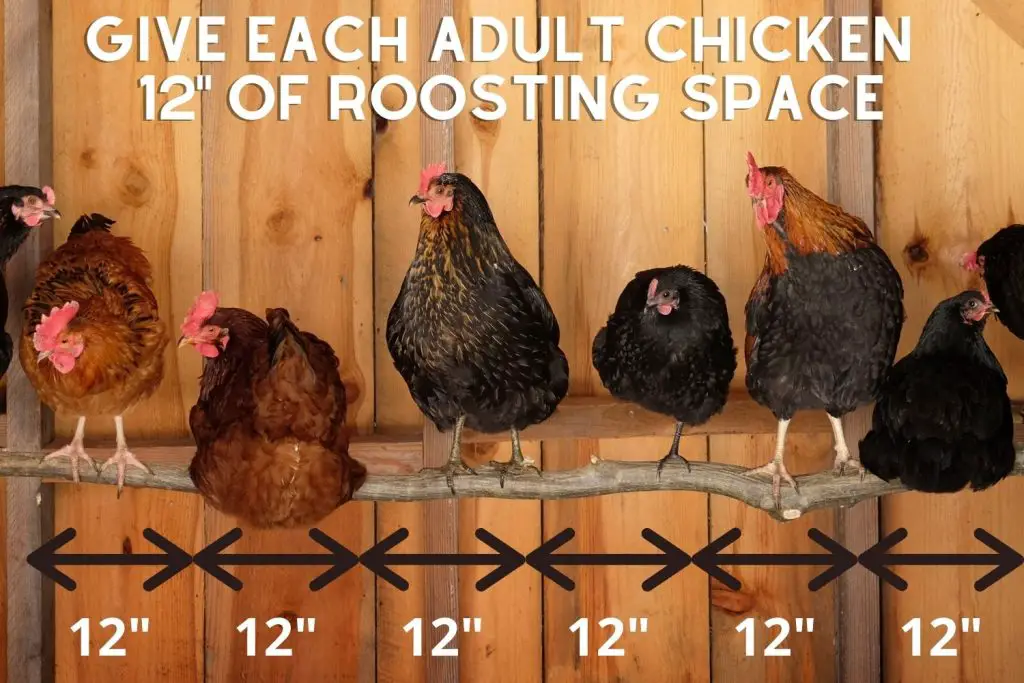
I have found that if chickens do not have enough room to roost inside the coop, they may look for a place outside, such as on top of their coop or in a tree for the night.
Make sure that you provide enough roosting space for your entire flock. Each adult chicken needs 12″ of roosting space. Bantam chickens need a little less space.
The lowest roosting bar should be higher than the highest nesting box. This will discourage chickens from trying to sleep in the nesting boxes.
I always set the highest roosting bar no higher than 4 feet and have additional roosting bars for my hens to jump down to. This is to help prevent chickens from injuring themselves if they jump down from the highest roosting bar.
Chickens can also develop bumblefoot or break a leg if they jump from too high.
For information on how to repair a broken chicken leg with $4, read my article How to Fix a Broken Chicken Leg With 4 Dollar Store Items.
6. Make Sure the Chicken Coop is Clean
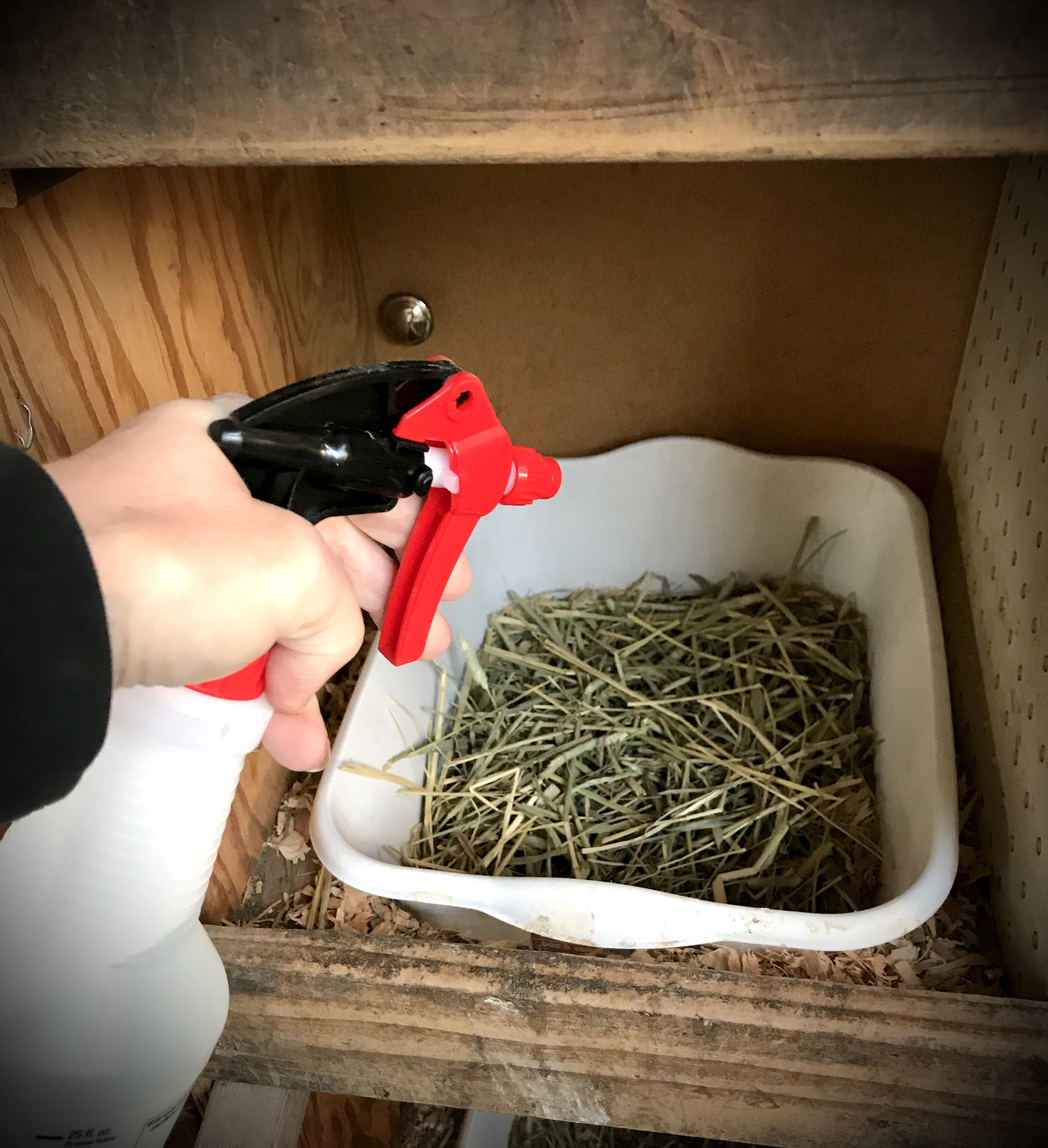
If you open your coop door and it smells of manure or ammonia, then it’s time to clean the coop. The chicken coop shouldn’t smell at all.
Chickens instinctively know that the fumes they are smelling is harmful to them and will want to frequent the area less often. It can even make them lay eggs less frequently or you may see them begin to lay eggs in another location, like out in the chicken run.
Chickens are locked up in their coop all night long and it isn’t healthy for them to breathe in toxic ammonia fumes.
If you are using the deep litter method and you smell ammonia, this means that you need to add more fresh bedding (pine shavings) to the top.
The carbon to nitrogen ratio has to be just right. Another way of putting this is that the “brown to green ratio” or in the case of your chickens, the bedding to manure ratio has to be just right or it will smell.
For composting, there should be a carbon to nitrogen ratio of 1:2. Because of the high nitrogen content in chicken manure, you many find that you need to add additional bedding (carbon). This will make the ratio closer to a 1:1 ratio.
Ammonia Fumes are Overwhelming and Toxic to Chickens
- It can irritate the mucous membranes.
- Increased ammonia levels can damage the respiratory tract.
- It can decrease their immune system.
- Increases the chances of bacterial infections.
- Increase susceptibility to E.coli infection.
- It can also decrease a chickens egg production.
The average chicken produces about 11 lbs. of poop a month! Nitrogen in chicken manure is broken down by bacteria and forms ammonia.
To keep it simple, I always use this rule, “If it smells like ammonia then add more bedding.”
According to the Department of Health:
Exposure to high concentrations of ammonia in air causes immediate burning of the eyes, nose, throat and respiratory tract and can result in blindness, lung damage or death. Inhalation of lower concentrations can cause coughing, and nose and throat irritation.
Department of Health
7. Sprinkle Fresh Herbs in the Chicken Coop

I have found so many benefits of using both fresh or dried herbs in my chicken coop. It is both healthy for your flock of chickens and also has some safety benefits too! For a detailed list of herbs to use for different purposes, read my article 5 Important Ways To Use Herbs Around Your Chickens.
- Sprinkle Herbs In Nesting Boxes: There are many herbs that help to stimulate egg production and help to deter parasites.
- Plant Herbs Around the Perimeter of the Coop: Plant herbs that will help to deter rodents and pesky insects.
- Scatter Herbs In Coop: Scatter herbs in the coop that help to fight parasites, have calming effects, stimulate egg production, deter rodents and smell good too!
- Add Herbs to Chicken Feed: Add herbs to your chicken feed that will help to fight internal parasites and increase their egg production!
- Sanitize the Chicken Coop: There are many herbs that you can use to sanitize your chicken coop.

Increases egg laying naturally.
- Improves chicken health.
- Deters parasites: mites, lice, fleas & flies as well as mice, rats, raccoons, coyotes, opossums and more!
- On SALE!
- Shop: Nesting Box Herbs
Conclusion: How to Get Your Chickens to Go Into the Coop at Night-7 Simple Tips
The chicken coop is the safest place for your flock to roost at night to protect them from nighttime predators. But sometimes new chickens need a little help learning that they need to go back into the coop at night.
- Lock them in the coop for 1-2 weeks.
- Leave a light on for them.
- Check the chicken coop for parasites.
- Check the coop for rodents and predators.
- Make sure you have enough roosting bars.
- Keep your chicken coop clean.
- Sprinkle some fresh or dried herbs to make their coop a desirable place to be.
With a little encouragement and coop modifications they will be roosting in their safe haven in no time. Just be patient with them.

